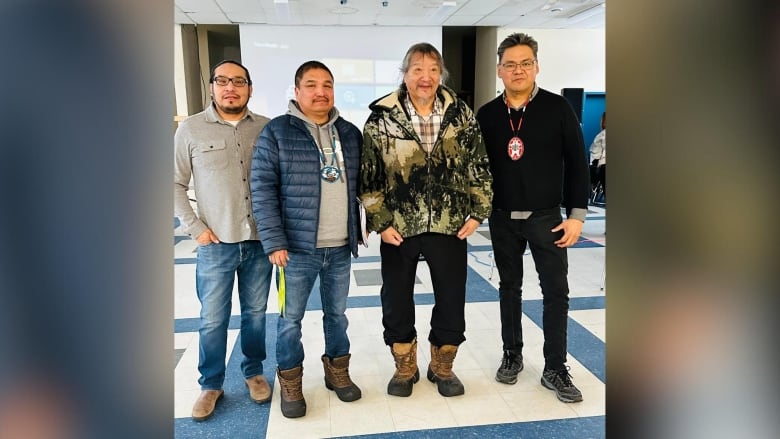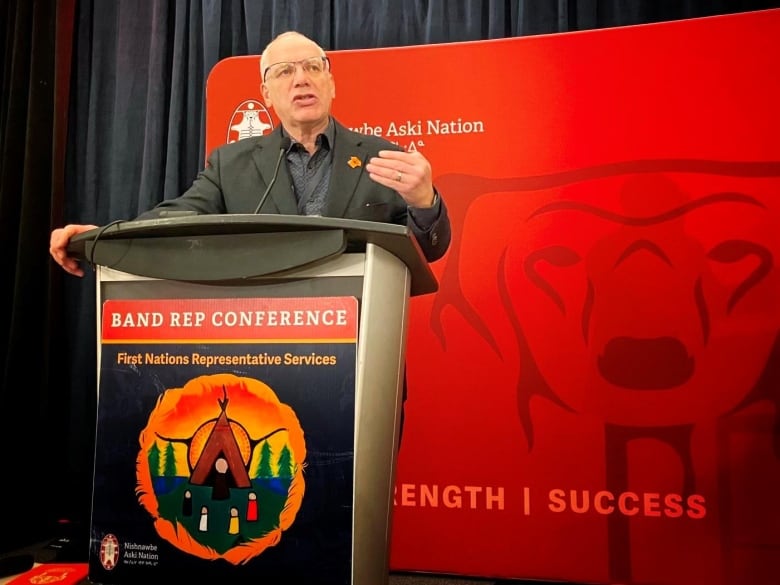Sandy Lake First Nation is taking back ownership of its child and family services, helping pave the way for other First Nations in northwestern Ontario to do the same.
The remote community with roughly 4,000 members recently celebrated the grand opening of its band representative (band rep) office in Thunder Bay. The program offers wraparound support to Sandy Lake members with children who may be at risk of entering the child welfare system, and acts as a liaison between the family, First Nation, and child and family service agencies.
What makes band rep unique is its focus on preventing children from ending up in the system, says Sandy Lake Chief Delores Kakegamic.
“We’re trying to build something where a person who is struggling, especially young people with young families, to give them opportunities, to give them training, to know how to go about trying to improve their way of living,” Kakegamic said.
“It starts with the parents. Children are not the problem. Parents need to gain these skills to be able to support their children in a way that the children [can] flourish.”
Recent national developments have fuelled the momentum behind band rep in northwestern Ontario:
- In November, the Federal Court approved a $23-billion settlement agreement for First Nations children and families who experienced racial discrimination through Ottawa’s chronic underfunding of the on-reserve foster care system and other family services. It amounts to a more than $40-billion package, with the government setting aside an additional $20 billion for long-term reform of the system.
- Last month, the Supreme Court of Canada unanimously upheld the federal government’s Indigenous child welfare law, Bill C-92. The law affirms Indigenous nations have jurisdiction over child and family services, and outlines national minimum standards of care.
“It’s been a very good opportunity with this new funding for First Nations to actually take a look at our children and family services and have a hand in it, have a say in it — not just be told,” Kakegamic said.
Keeping the family circle together
Sandy Lake is about 450 kilometres northeast of Winnipeg and 600 kilometres northwest of Thunder Bay. Many Sandy Lake members have settled in those cities due to lack of housing and medical services in the First Nation, Kakegamic said.
The First Nation now has band rep offices in Winnipeg and Thunder Bay, which has made services more accessible and helped the community keep track of how many children are in care, she said.
Sandy Lake is part of Nishnawbe Aski Nation (NAN), a political territorial organization that represents 49 First Nations across Treaties 9 and 5. NAN recently held a band rep conference in Winnipeg.
Bobby Narcisse, deputy grand chief of NAN, said chiefs are asking for support to develop band rep programs in a way that recognizes their community’s distinct challenges.

This would allow them “to build a program that is reflective of our language, of our culture, that is respectful to our traditional ways of bringing up our children,” Narcisse said.
With the current patchwork system in place, Narcisse said, a lot of families don’t know their options.
“They didn’t know that they could have legal assistance, they didn’t know that they could approach the First Nation to really access many of these prevention initiatives,” he said.
The landmark Federal Court settlement follows a 2019 Canadian Human Rights Tribunal (CHRT) ruling, which includes orders that Ottawa must fund band rep programs in Ontario.
“It’s really ensuring that our families are protected and they’re given the resources that they require to keep the family circle together,” Narcisse said.
NAN is working with Indigenous Services Canada so prevention programs like band rep are created at the community level, he said.
Narcisse applauds Sandy Lake’s work and said Kingfisher Lake First Nation is in the early stages of developing its own band rep program.
A ‘bombardment’ of remedies
Falconers LLP, which specializes in Indigenous law, has worked with NAN on the band rep file for years and served as counsel for the organization at the CHRT proceedings, during which NAN held intervener status.
Julian Falconer, principal of the firm, said while the Federal Court settlement marks a milestone victory, it’s crucial for First Nations to be prepared for what comes next so they’re set up for success.
“It’s almost like the communities are being bombarded with remedies — and so it becomes important, whether it’s the influx of funds or the other changes being proposed, that there be some level of education, preparedness and mitigation of risk.”

That’s why NAN is leading a Co-ordination and Oversight Team, the first of its kind in Canada, to help communities navigate the next phase, which includes the development of band rep programs.
“Community members taking care of fellow community members and all of them exercising their sovereignty in respect to their children — these are extremely positive developments,” Falconer said.
However, what concerns him most is these initiatives are being developed while Canada still operates under the Indian Act, “which is honestly a draconian piece of colonial legislation.”
“A key piece to the solution is we have to dismantle the structures that are propounding or promoting the discrimination and until we do that, everything else is going to be putting lipstick on a pig,” he said.
‘Being proud of our children, families’
Kakegamic said Sandy Lake’s next goal is to create its own child welfare law to define the community’s path forward.
“Having this law would give us this uniqueness of being proud of our children, proud of our families, that this is ours,” she said. “It’s a way to express ourselves that we do care for our children and our families and this is how we would like to do it — taking ownership.”
She added that Sandy Lake’s band rep staff would be happy to share their strategies with other First Nations.
“We’re here to help. One child is everybody’s child — it’s our responsibility to look after one another.”



